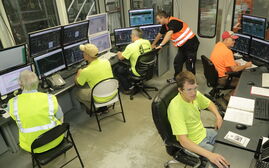CEI’s greenhouse gas emissions disclosure is part of global movement
 Courtesy / Coastal Enterprises Inc.
This infographic shows greenhouse gas emissions calculations for a vegetable farm that’s part of CEI’s portfolio. Emission estimations were based on the borrower’s business sector. Total CO2e emissions attributed to the financing of the company were considered typical for CEI’s small business portfolio, where two-thirds of CEI’s deals result in less than 5 tons of CO2 emissions.
Courtesy / Coastal Enterprises Inc.
This infographic shows greenhouse gas emissions calculations for a vegetable farm that’s part of CEI’s portfolio. Emission estimations were based on the borrower’s business sector. Total CO2e emissions attributed to the financing of the company were considered typical for CEI’s small business portfolio, where two-thirds of CEI’s deals result in less than 5 tons of CO2 emissions.
For the first time, Coastal Enterprises Inc., a community development financial institution headquartered in Brunswick, has calculated the greenhouse gas emissions of the companies in its small business lending portfolio.
The emissions associated with CEI’s portfolio as of Sept. 30, 2020, were 12,641 tons of greenhouse gases, according to a report issued Tuesday. That's equal to the emissions from driving 2,724 gasoline-powered vehicles for a year.
The total represents estimated emissions across 343 companies with a total outstanding loan balance of $45.89 million.
The assessment and disclosure are part of a global movement for financial institutions to disclose their impact on climate change.
CEI used a method developed by the Netherlands-based Partnership for Carbon Accounting Financials, launched in 2015 by a group of Dutch financial institutions to assess emissions associated with their loans and investments.
CEI collaborated with two other community development financial institutions — Partner Community Capital and Self-Help Credit Union — to create a guide that financial institutions, and particularly CDFIs, can use to conduct similar assessments.
The comparative emission intensity — defined as tons of carbon dioxide emitted per $1 million dollars invested — among the three organizations is relatively modest, according to the release. That's because CDFIs don’t generally invest in the most heavily polluting sectors related to oil, gas and mining.
By disclosing the greenhouse gas emissions that lenders are accountable for through their financing, the organizations hope investors will be able to incorporate the information into their decision-making. From a broader portfolio perspective, such disclosures are expected to help lenders identify sectors where targeted financial products or technical assistance could encourage business owners and project developers to incorporate plans for greenhouse gas emission reductions into their business practices.
Over 250 financial institutions, representing more than $71 trillion in assets, have joined the Partnership for Carbon Accounting Financials since its inception in 2015. In 2019, CEI participated in a cohort to adapt the European Partnership for Carbon Accounting Financials methodology to the North American market and since then has been joined by five other community development financial institutions.
The Partnership for Carbon Accounting Financials’ growing membership is an opportunity to put pressure on the largest financial actors in the world to make cleaner investment decisions and commit to transparent climate disclosures, said CEI President Keith Bisson.
“This disclosure establishes a baseline for us to understand our portfolio and Maine’s small business economy, and how we intersect with both as we deepen our mission impact in addressing the climate crisis,” Bisson said. “It’s an opportunity to hold ourselves and all lenders and investors accountable and, together, move towards a low-carbon future.”
To read the full report, click here.














0 Comments